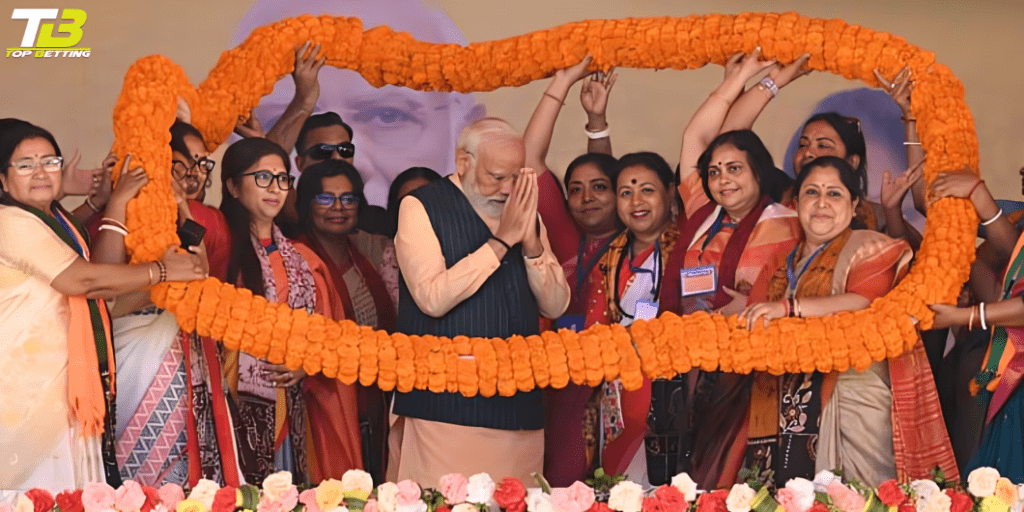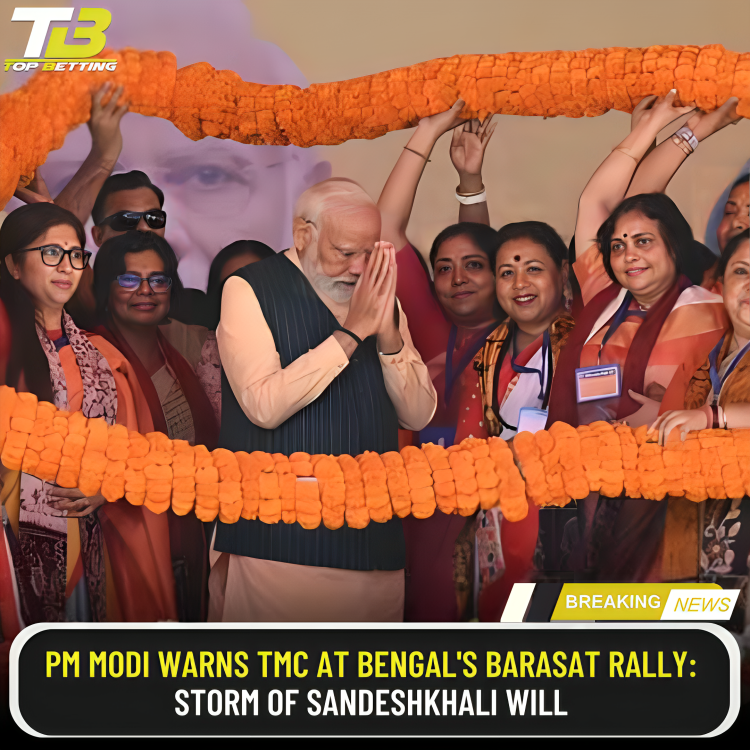
PM Modi warns TMC at Bengal Barasat
PM Narendra Modi addressed a public rally at Barasat in West Bengal’s North 24 Parganas district, where Sandeshkhali is situated.
Prime Minister Narendra Modi on Wednesday addressed a public rally at Barasat in West Bengal’s North 24 Parganas district, where Sandeshkhali is situated, after inaugurating India’s first underwater Metro section between Howrah Maidan and Kolkata’s Esplanade on Wednesday.
Raising the Sandeshkhali issue, PM Modi alleged that atrocities against women are being committed in West Bengal under the Trinamool Congress rule. “Whatever happened in Sandeshkhali is a matter of shame. The TMC government is trying to protect the person responsible for this. However, they have received a setback from the high court as well as the Supreme Court… The storm of Sandeshkhali will reach every part of West Bengal,” Modi said at a ‘Nari Shakti Vandan Abhinandan’ programme in Barasat where thousands of women gathered.
A large number of women in Sandeshkhali have claimed that suspended TMC leader Sheikh Shahjahan and his “gang” captured swathes of land by force, besides “sexually harassing” them. Shajahan Sheikh has been arrested by the Bengal police.
Modi arrived in Kolkata on Tuesday evening and headed straight to Raj Bhawan, where he stayed the night, a senior state BJP leader said.
On Wednesday morning, he inaugurated the Howrah Maidan-Esplanade section of Kolkata Metro’s East-West Metro corridor, a part of which runs under the Hooghly River. The PM also inaugurated the Kavi Subhash-Hemanta Mukhopadhyay and the Taratala-Majerhat Metro sections, besides other projects.
Later in the afternoon, he headed to Barasat to address a public rally.
At the rally, Modi yet again hit out at the RJD chief Lalu Prasad Yadav over his remarks on the prime minister’s family. The RJD is part of the Opposition’s INDIA bloc.
“The leaders of the INDI alliance have gone crazy as the NDA is certain to return to power. Therefore, they have started abusing Modi. The corrupt leaders of the INDI alliance are asking about my family and saying that I am against familism because I don’t have a family. They want to know about my family. They, however, should come here. My sisters who are attending this programme are ‘Modi ka parivar’,” said Modi.
Addressing the women, the PM said, “Whenever Modi goes through any suffering, then women shield me from it. The women of Bengal become Goddess Durga for me. Today, every countrymen is calling himself/ herself ‘Modi ka parivar’.”
Last week, state BJP president Sukanta Majumdar said that if the “tortured women” express their willingness to meet the prime minister, the party would facilitate a meeting.
Last week, Modi addressed two rallies in West Bengal, one each at Arambagh in Hooghly district and Krishnanagar in Nadia district.
He had launched a no-holds-barred attack against the Mamata Banerjee-led TMC government over “atrocities on women” in Sandeshkhali and said that the entire country is seething with anger over the issue, and called upon people to ensure her party’s defeat in the upcoming Lok Sabha polls.
The reference to the “storm of Sandeshkhali” in PM Modi’s speech harks back to an incident in 2019 when violence erupted during the Lok Sabha elections in Sandeshkhali, resulting in casualties. By invoking this incident, the Prime Minister not only alludes to the tumultuous past but also sends a clear message to the TMC regarding the potential electoral storm they might face.
The choice of Barasat as the venue for this rally holds significance as it is strategically located in the North 24 Parganas district, a region that has witnessed political fervor and has been a battleground for competing political narratives. The PM’s presence in Barasat indicates the Bharatiya Janata Party’s (BJP) determined efforts to make significant inroads in a region that has historically been a stronghold of the ruling TMC.
PM Modi’s warning serves as a political forecast, hinting at the political repercussions that could unfold for the TMC. The mention of Sandeshkhali, a place marred by electoral violence, amplifies the stakes involved in the upcoming elections and the need for a fair and peaceful democratic process.
Additionally, the use of the term “Sandeshkhali storm” adds a metaphorical layer to the Prime Minister’s message. It suggests a gathering political force that has the potential to reshape the political landscape in West Bengal. The PM’s address is not just a cautionary note; it’s a rallying cry for supporters and a declaration of intent for the BJP to challenge the existing political dynamics in the state.

In the run-up to the elections, such political rallies and speeches play a crucial role in shaping public opinion and setting the tone for the electoral battle. PM Modi’s warning at the Barasat rally signals a heightened political climate in West Bengal, where the echoes of past incidents and the promises for the future converge in a charged atmosphere. The political storm alluded to by the Prime Minister could very well define the electoral narrative as West Bengal prepares for a closely watched and fiercely contested battle.











